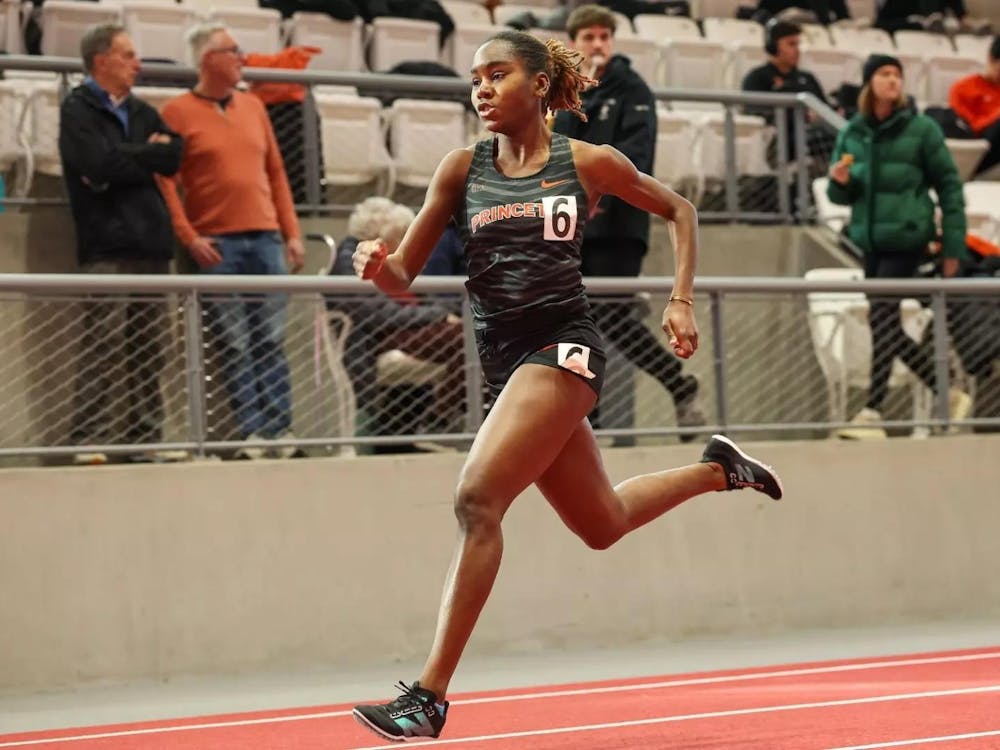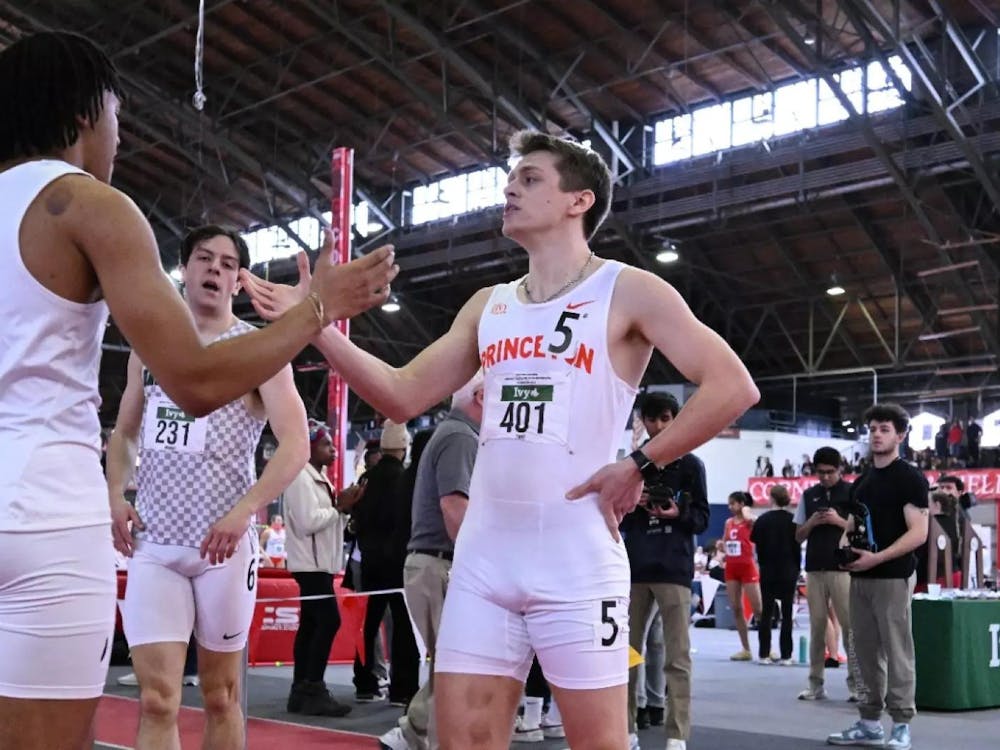If I asked 100 Princetonians who they think is the best athlete currently enrolled, I would expect to hear a lot of the usual suspects. Senior Tom Schreiber, senior Caraun Reid, sophomore Ashleigh Johnson, perhaps even sophomore Anna Van Brummen from a few particularly informed fans. I would be surprised to hear even one person name freshman Ariel Hsing. Hsing seems like the nicest girl ever, until you put a paddle in her hand. Then the three-time American table tennis champion transforms into a ball-smacking, shot-getting, spin-imparting monster, ready to chew you up and spit you out like nearly all her previous opponents.
Hsing got her humble start like so many other great athletes: by complete chance. Her mother used to play growing up in China and frequented the Palo Alto Table Tennis Club with her father. One night, they could not find a babysitter for seven-year-old Hsing and were forced to bring her with them. She took to the game like a fish to water, winning her first national championship in the under 10 division within a year. Hsing and her parents were surprised and she upped her training regimen. She made the U.S. team at the cadet (under 15) level and traveled the globe playing for the red, white and blue.
“I trained more and more. It was a gradual improvement. Then, you get to a point in time where it’s like, ‘Hey, I could make the Olympics,’” Hsing said.
And make them she did. In London, the wide-eyed 16-year-old was seeded 46th and progressed to the round of 32 before falling 4-2 to eventual gold medalist Li Xiaoxia of China. She rated the match “a 10 out of 10, or maybe a 9.9, as I wasn’t quite there.”
When it came time to choose a college, the 4.0 student was attracted by the University's rigorous academics and table tennis prowess. Yes, that’s right, table tennis has been one of the University’s most competitive teams in recent years, having finished runner-up in the coed division at collegiate nationals multiple times. Adam Hugh ’10, who recently qualified for the U.S. World Championships team, was a doubles champ and singles runner-up as a Tiger. What the club had lacked, however, was a women’s team. And I don’t just mean lacked a strong women’s team. I mean Princeton had never even fielded a women’s team before. At the same time as Hsing, but independently of her, Canadian champion freshman Shirley Fu got accepted to the University. All of a sudden, the club was halfway to a full squad. Hsing and Fu put their heads together.
“We were looking for more players. I think Shirley knew Robin [Li] and I knew Marisa [Chow],” Hsing said.
The freshman foursome immediately became one of the best college teams in the country. Collegiate table tennis team matches take a best of five format that includes four singles matches and a doubles match if the teams are tied after singles. Thus Princeton, with the best duo in the country, could conceivably win every match if Hsing and Fu played well enough. The championship run was underway, but it was not the traditional Rocky-esque grind one might expect.

“In high school, I practiced six days a week for three or four hours each day,” Hsing said. “In the fall here, I played maybe once or twice a week for two or three hours at a local club. In the spring, I played maybe once a week and only at Dillon [Gymnasium].”
Yet when I commented that she got by this season on talent alone, she replied, “I don’t believe in talent.” Regardless, a training schedule that would make Allen Iverson jealous did not seem to have any effect on the superstar. Hsing and the team breezed through the divisional and regional tournaments. Holding the highest ranking of any collegiate player by over 10 percent entering nationals in Monroeville, Pa., Hsing was the clear number-one seed in women’s singles. She and Fu teamed up as the top doubles seed, and the women’s team was the second-ranked squad behind University of California, Berkeley. The coed team was seeded seventh to boot. It was a packed weekend, to say the least.
The tournament got off to an inauspicious start on Friday, when the Tigers dropped their first match in coed group play to No. 6 University of Toronto. The rest of group play went swimmingly, though, and Princeton advanced to knockout play in both team categories. The first day of the tournament also saw the doubles competition, where Hsing and Fu advanced to the semifinals with ease. There they met the fourth-seeded duo of Zhou and Guo also from Toronto. The stubborn Varsity Blues played fearlessly, trading games with the Tigers before winning the decisive fifth game 11-6.
“We realized that when we were playing, we didn’t fight as hard as they did. It humbled us and let us know we needed to try harder. It ended up being a blessing in disguise,” Hsing said.

Hsing and Fu got their groove right back on Saturday in singles. Fu, seeded sixth, was able to upset third-ranked Stephanie Sun of Duke before falling to Northeastern’s Yuhua Li in the semifinals. Hsing lost nary a game on her run to the finals.
“I had already beaten [Li] three times at regionals, but this time she played up to her true ability.”
It didn’t make much of a difference. Hsing came away with a 4-1 victory. One down, two to go: The championship round of both team competitions loomed the next day.
“There was a banquet that night. People from the other teams were going out to clubs, but all four of us from Princeton met in the hotel lobby to do homework. I was up until four a.m. studying,” Hsing said.
It was not an ideal night to put the student in student-athlete. A few hours later, the coed group fell 3-2 in the first round to the number-eight seed Tulane and would end up 12th in the consolation bracket. Only the women’s competition remained and familiar foe University of Toronto was the quarterfinal opponent. The match would come down to doubles. The champions from two days earlier, Zhou and Guo, stood in the way.
“Shirley and I were still very confident, since we felt like we lost the first match due to mental weakness. We went out fighting, shouting, trying to pump each other up. Mentally, we were completely different, but physically it was the same,” Hsing said.
The Tigers took the first game, but the Varsity Blues took the second. Princeton regained the advantage with a third-game win and finished it off in the next one. On the last point, Hsing and Fu so thoroughly bamboozled the Toronto players that they ran into each other and one broke a paddle.
Texas Wesleyan, 11-time reigning coed champs and one of only a few fully-funded collegiate table tennis squads on the continent, was next up in the semifinals.
“They came out with a good strategy against us. They put their lowest player against me and their best against Shirley. We rooted for her really hard and she won,” Hsing said.
Again, the match came down to doubles and again Hsing and Fu triumphed. Berkeley, meanwhile, had steamrolled its two opponents and had not dropped a single individual match in the tournament. The team’s chances lay solely with its top two players.
“Ariel and Shirley played very clutch,” said club faculty adviser and professor of French, Volker Schroder. “Every team was gunning for them. It was a very impressive performance.”
The collegiate national championship, predictably, came down to the final doubles match. At this point, though, there was no stopping Hsing and Fu.
“We were all out versus Cal. My arm was hurting, but you can’t think about that. We were super focused and played really well,” Hsing said.
They swept the Golden Bears’ duo in straight games and gave Princeton its first-ever team title.
“We were really happy afterward. It was a team effort. To go through that with someone else is really cool. We were shocked, too, since we had been talking about winning nationals since the fall and it actually happened,” Hsing said.
Next year could be even better, though expectations are being kept in check.
“We’ve got at least one good girl coming and potentially another Olympian,” Schroder said. “But the women’s field was stronger this year. International players are coming to the United States. There are grad students from China. It’s ambitious to say we want to go for a repeat.”
Right now, Hsing is not so concerned with the outcome.
“We bonded so much during the tournament. My teammates are wonderful people. I look forward to bonding together again next year.”







